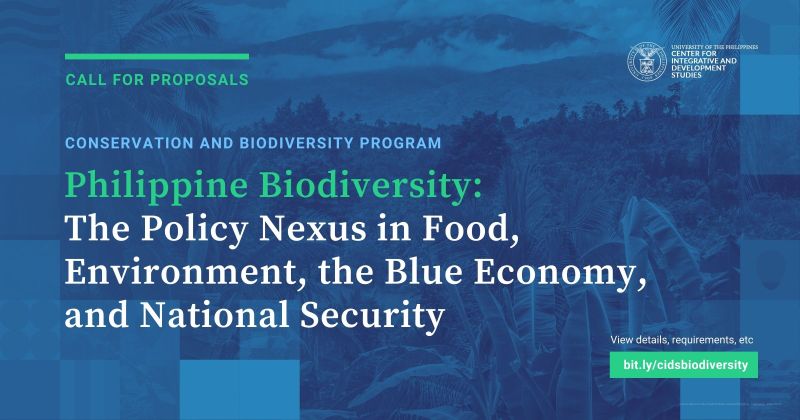Call for Research Proposals: Philippine Biodiversity | The Policy Nexus of Food, Environment, the Blue Economy, and National Security

The Conservation and Biodiversity Program (CBP) of the Center for Integrative and Development Studies (CIDS) University of the Philippines calls on interested UP faculty and staff to express their interest in participating in a policy research program, “Philippine Biodiversity: Policy Nexus of Food, Environment, the Blue Economy, and National Security.”
FOCAL AREAS
The CBP welcomes one-page research concept proposals on the following focal areas:
1. Fisheries, aquaculture, and food security
This area will focus on assessing outcomes of fisheries policy on food security informed by scientific evidence on climate and environmental changes, economic prospects, social change, and gender issues. A suggested area is to relate aquaculture and fisheries innovation and how this impacts coastal nutrition profiles, geographies, logistics, disaster risk reduction, fisheries stock management, economics, ecological risks such as biological invasion, and the issue of genetically modified fish (GM fish).
2) Effectiveness of protected areas in the context of resiliency in environmental change
This area will focus on assessing the impact of protected areas policies and legislation on impacts such as on financial sustainability of protected areas, ecological and biodiversity outcomes, community stakeholder participation, employment, and small and medium enterprise investment in communities that host protected areas.
3) Strategic policy dimensions of marine environmental science research
This area focuses on the nexus between geopolitics, biodiversity, and marine science research in the context of national priorities in developing the Blue Economy and transboundary issues. This area highlights the role of governmental science advice, non-governmental marine environment advocacy, and science diplomacy. The role of defense-related and sponsored research in informing public policy is an area that needs to be explored here. For national defense and security, a policy study on the doctrine of technologically superior knowledge-gathering and storage platforms as key for securing national interests in territorial waters and the EEZ (Exclusive Economic Zone) is a suggested focus.
BACKGROUND
Philippine policies concerning biodiversity conservation are one of the most progressive in the world. However, there is a need to assess the policy impact of biodiversity and if biodiversity policy meets the principles of ecological integrity and sustainability, and whether outcomes are realized. This will inform the country to take on its international obligations in biodiversity conservation to meet UN Sustainable Development Goals 13,14 and 15.
We expand the remit of biodiversity policy in a nexus approach to the complex problems the Philippines faces. As biodiversity is essential in providing the sustainable base for agriculture and fisheries and its strategic dimensions, three foci of policy research in this program include assessing 1) the nexus between fisheries, aquaculture, and environmental sustainability, 2) the effectivity of protected areas governance and ecological outcomes in the context of resiliency in global anthropogenic environmental change and, 3) policy and strategic dimensions in marine science research (MSR). These areas have all relevance to food, environment, and national security.
PROGRAM FRAMEWORK: POSTNORMAL SCIENCE FRAMEWORK
The program framework is under the postnormal science (PNS) paradigm which is promoted by the International Science Council (ISC) and the International Network for Governmental Science Advice (INGSA). PNS is a framework to deal with complex science and society issues that focus on problem-solving that tends to be ignored in traditional modes of science practice. PNS deals with the uncertainty of outcomes and the plurality of legitimate perspectives. The inclusion of stakeholders in the framing of solutions to complex problems in a nexus context is a coherent approach to decision-making in the crafting of public policy. This results in new approaches to knowledge quality assurance. This leads to a framework of science-informed rather than science-based policy advice. Postnormal Science in policy appreciates the complexity of biophysical and social systems in the context of human commitments and values.
As it is in the PNS framework, proponents are expected to come up with multidisciplinary proposals which include the management of evidence and knowledge, extended community participation, peer networks, and peer review, urgency of interventions, extended and consensus management of risks and opportunities, and identification of policy outcomes. Proponents are expected to develop Filipino approaches to governmental science advice.
POLICY RESEARCH OUTCOMES
Policy research will provide input to legislative and management interventions by identifying risks and opportunities for positive policy outcomes in biodiversity, food security, the Blue Economy, and National Security.
Proponents are expected to present their recommendations to stakeholders such as the science research community, policymakers, communities, and the general public.
FUNDING, APPLICATION PROCESS, QUERIES
Grant applicants (UP-affiliated personnel) may apply for grants up to one (1) million Philippine pesos per focal area. Grant exclusions include capital and equipment purchases. One grant will be given for each focus area.
Proponents must submit a one-page research concept proposal on or before 1 March 2024, 5 pm. Only shortlisted one-page concept proposals will be invited to submit full proposals.
Send all queries and one-page concept proposals to:
Benjamin M. Vallejo ([email protected])
Convenor, Conservation and Biodiversity Program
Center for Integrative and Development Studies
University of the Philippines
Benjamin M. Vallejo, Jr. is Professor at the Institute of Environmental Science and Meteorology, College of Science, University of the Philippines Diliman.
ABOUT UP CIDS CONSERVATION and BIODIVERSITY PROGRAM
The Conservation and Biodiversity Program (CBP) is one of 16 Research Programs of the University of the Philippines Center for Integrative and Development Studies (CIDS), which is the policy research unit of the university.